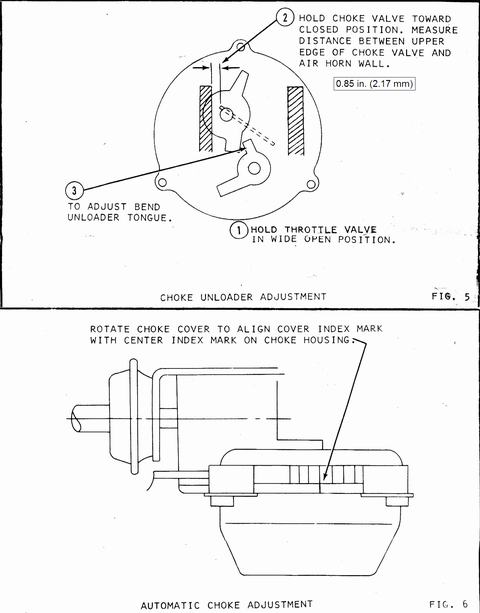| Revision as of 17:06, 6 December 2013 ddgonzal (Talk | contribs) <- Previous diff |
Revision as of 17:22, 6 December 2013 ddgonzal (Talk | contribs) (->Automatic Choke) Next diff -> |
||
| Line 3: | Line 3: | ||
| = Automatic Choke = | = Automatic Choke = | ||
| - | Since the amount of choke needed depends on outside temperature, adjust an automatic choke each summer and winter as necessary. | + | Since the amount of choke needed depends on outside temperature, adjust an automatic choke each summer and winter as necessary. |
| + | The air cleaner must be removed to gain access to the choke. While removing, note any vaccum lines removed. These must be reconnected or plugged before running the engine. | ||
| + | |||
| + | == Procedure == | ||
| To adjust the automatic choke, slightly loosen (do not remove) the three screws holding the round part. Rotate it counterclockwise for more choke, clockwise for less choke. | To adjust the automatic choke, slightly loosen (do not remove) the three screws holding the round part. Rotate it counterclockwise for more choke, clockwise for less choke. | ||
| Line 12: | Line 15: | ||
| Here's the secret to easy and correct adjustment: | Here's the secret to easy and correct adjustment: | ||
| - | # With engine fully cold, set choke tight enough to just close the choke completely when the throttle is opened. Rotate it counterclockwise for more choke. | + | # With engine fully cold, set choke tight enough to just close the choke completely when the throttle is opened slightly. Rotate it counterclockwise for more choke |
| - | # Warm the engine up. Blip the throttle occasionally to let the choke open as the choke warms. If, when the engine is fully warm, the choke hasn't completely opened, there is a problem. | + | # Reinstall the air cleaner. Reconnect any vacuum hoses. |
| + | # Warm the engine up. Blip the throttle occasionally to let the choke open as the choke warms. | ||
| + | # Let the engine fully warm (about 10 minutes running, or when temp gauge reaches normal) | ||
| + | # If the choke hasn't completely opened 100% straight up and down, there is a problem. Perhaps the choke was adjusted too tightly. Double check step 1 | ||
| # If it opened all the way, Note the single mark on the cover. This is your new choke mark. In the winter set it a mark or so tighter (following step 1). Loosen the screws to turn this. | # If it opened all the way, Note the single mark on the cover. This is your new choke mark. In the winter set it a mark or so tighter (following step 1). Loosen the screws to turn this. | ||
Revision as of 17:22, 6 December 2013
When the engine is fully warmed, the choke must be fully off for correct operation. When the engine is cold, the choke should be partly or fully closed. When the outside temperature is cold and engine is cold it must be fully closed. See Choke Operation for more details.
Contents |
Automatic Choke
Since the amount of choke needed depends on outside temperature, adjust an automatic choke each summer and winter as necessary.
The air cleaner must be removed to gain access to the choke. While removing, note any vaccum lines removed. These must be reconnected or plugged before running the engine.
Procedure
To adjust the automatic choke, slightly loosen (do not remove) the three screws holding the round part. Rotate it counterclockwise for more choke, clockwise for less choke.
The nominal (initial) choke setting is on the middle mark:
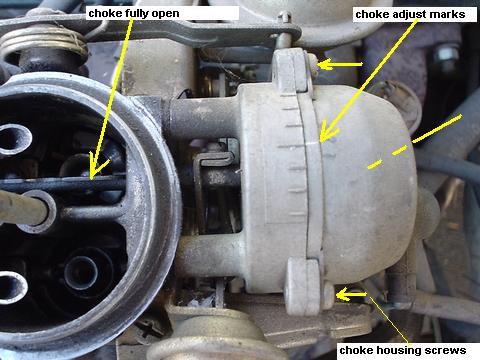
NOTE: This 'nominal' setting is where a carburetor rebuilder will set it. BUT IT IS NOT ALWAYS THE FINAL SETTING.
Here's the secret to easy and correct adjustment:
- With engine fully cold, set choke tight enough to just close the choke completely when the throttle is opened slightly. Rotate it counterclockwise for more choke
- Reinstall the air cleaner. Reconnect any vacuum hoses.
- Warm the engine up. Blip the throttle occasionally to let the choke open as the choke warms.
- Let the engine fully warm (about 10 minutes running, or when temp gauge reaches normal)
- If the choke hasn't completely opened 100% straight up and down, there is a problem. Perhaps the choke was adjusted too tightly. Double check step 1
- If it opened all the way, Note the single mark on the cover. This is your new choke mark. In the winter set it a mark or so tighter (following step 1). Loosen the screws to turn this.
MORE DETAILS
If after adjusment, the choke does not open 100% when engine is warm:
- Check for 12V at the choke wire while engine is running. If it doesn't have voltage it won't work. If your alternator is not charging, the choke won't heat up.
- Check the spring tension on the choke. If it doesn't have enough 'spring', buy a new electric one. But the Datsun ones are mostly still going strong even at 40 years old.
Hitachi chokes can be silver or black. They both work the same, are same diameter, and are wired the same. One or two wire units are connected the same. Note the Hitachi symbols.

Center mark - WRONG (choke is not closed with carb/engine cold). Center mark is just an intial setting.
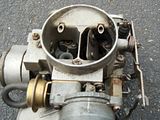
Correct for this carburetor for winter. Note that choke has fully closed with housing rotated this far.
It will vary by carb and choke heater -- and whether summer or winter
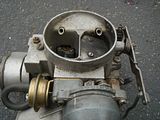
While checking the rotation, push the butterfly down and let it spring back. You want it where it will just fully close each time. If you turn it farther it may not open fully when warm.
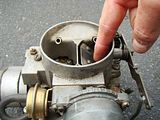
ALSO IMPORTANT: Open the throttle a bit and check that the choke butterfly still closes all the way.
Tighten the choke housing screws (lightly, they are just tiny screws!), the warm the engine fully up, then ensure that the choke has opened 100%. Blip the throttle. If the choke is not 100% open (straight up and down) then the heater is not working correctly (may not be getting voltage, or may be worn out).
With engine FULLY warm, the choke must be fully open (butterfly plate must be straight up and down).

On this Datsun the center mark happens to be correct for summer -- but not for winter. Since the heater coil is temperature dependent, it should be set for the ambient temperature.
Correct Installation Position
When the engine is cold, if you rotate the choke housing clockwise and anti-clockwise, and IT DOESN'T MOVE THE BUTTERFLY, check to make sure it is installed right.
The Heater tang (in round part) must be installed clockwise of the Choke Butterfly lever (on carb)
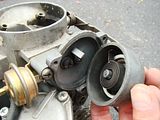
You might be able to just look at the mark of the housing -- put the mark a bit clockwise in relation to the Lever
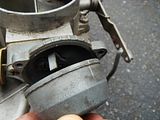
Double-check where the tang lines up in relation to the Mark when cold (some brands may be different).
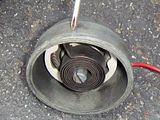
After fitting the choke housing screws (slightly loose) rotate the housing anti-clockwise so that it closes the butterfly. Don't turn it any further. You want it to where it just closes the choke blade.
Rebuild Setting
Fast Idle Adjustment
This should only have an effect when the engine is cold, as it is related to the choke. The engine should run fast when started, then as it warms up and the choke is gradually released (blip the throttle to 'set' the cam), it should run slower until as the engine warms more, it comes off the cam and has no effect on warm engine.
Adjust for about 1200-2000 rpm (cold) or to your preference. It should be fast enough to run good, but not too fast. While Nissan has a specification, really it depends a lot on how cold it is where you live. If everything else is adjusted correctly (timing, no vacuum leaks, etc), you should be able to take off immediately and drive the car without "warming it up". If it dies, use a higher fast idle.
Manual Choke
Manual choke adjustment procedure: There is no adjustment.
The only thing to check regarding choke, mechanically speaking is: remove air cleaner and inspect:
- Choke knob all the way out: ensure butterfly valve is fully closed
- Choke knob all the way in: ensure butterfly valve is fully open
If this is not working correctly, loosen the choke cable clamp at the carburetor, adjust position of cable and tighten the clamp.
Operation
- To start when the engine when cold, pull the knob out.
- After starting, push the knob in a bit
- While warming up, constantly push the knob in or out until it sounds "right"
- When fully warm, the knob should be pushed all the way to the dash
If the engine doesn't run well with this method, there is something else wrong with the engine.

![[Datsun 1200 encyclopedia]](/wiki/upload/wiki.png)
